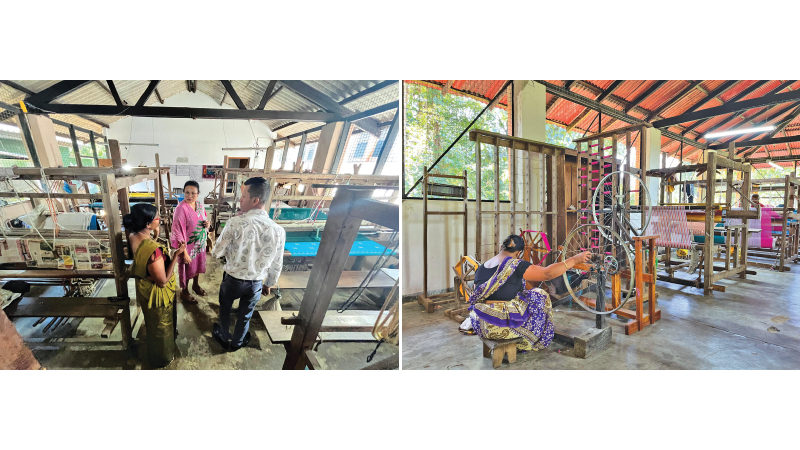Sri Lanka’s handloom industry, deeply rooted in tradition and cultural significance, stands at a pivotal moment. While it remains a symbol of exquisite craftsmanship and national heritage, it faces growing challenges—competition from mass-produced textiles, a dwindling number of artisans, and limited market access. Recognising these challenges, a pioneering research project is under way to integrate digitalisation into the handloom sector, ensuring its sustainability, accessibility, and global competitiveness.
This initiative, supported by the British Council’s Connections Through Culture Grant 2024, aims to bridge traditional weaving techniques with contemporary fashion and technology. By preserving craftsmanship while embracing digital transformation, the project aspires to secure the future of Sri Lanka’s handloom industry.
Creative exchanges
British Council Sri Lanka Country Director Orlando Edwards said, “The Connections through Culture grant represents a vital opportunity to strengthen and celebrate the cultural ties between the UK and Sri Lanka. Through this initiative, we are enabling creative exchanges, fostering mutual understanding, and supporting the growth of diverse artistic collaborations. By linking Sri Lankan talent with the rich expertise and networks of the UK, the British Council ensures that artists, cultural practitioners, and organisations in Sri Lanka have access to world-class resources, mentorship, and opportunities to showcase their work on a global stage. This grant is a testament to our commitment to nurturing international partnerships that enrich both local and global creative ecosystems.”
This research project brings together experts from Sri Lanka and the United Kingdom, fostering an interdisciplinary partnership. It is led by Dr. Sumith Gopura, Dr. Ayesha Wickramasinghe, and research assistant Kavindu Dharmakeerthi from the University of Moratuwa. Their expertise in design and craft research is complemented by Prof. Chaminda Hewage from Cardiff Metropolitan University and Dr. Tharindu Liyanagunawardena from the University of Reading, who bring specialised knowledge in computer science and digital accessibility.
The project envisions integrating cutting-edge digital tools and platforms to preserve Sri Lanka’s rich handloom heritage while expanding its global reach.
A core aspect of this project is to digitally document the tacit knowledge embedded in Sri Lanka’s handloom tradition. Historically, weaving skills have been passed down through generations via oral transmission and hands-on practice, making them vulnerable to loss in the modern era. This initiative will create a structured, accessible digital archive to ensure that invaluable craftsmanship is safeguarded for future generations.
The project’s key focus areas include Creating a Digital Repository – A comprehensive online archive featuring artisan profiles, weaving techniques, and product details to safeguard Sri Lanka’s craft heritage. It will also identify regional weaving styles, techniques and skill mapping to help artisans connect with global designers and buyers. The deliverable of the project enhances digital accessibility inclusive technology solutions to improve the connectivity of artisans in rural communities.
Empowering artisans
While Sri Lanka’s handloom sector holds immense global potential, artisans need contemporary design ideas to reach international markets. The team expects improving artisans design thinking through many engagement with them during the project.
The digital transformation of Sri Lanka’s handloom industry is not just about technological advancement—it represents a holistic strategy for sustainability, cultural preservation, and economic empowerment. By embracing digital tools, this initiative ensures that handloom weaving remains a viable profession for future generations while also promoting sustainable alternatives to fast fashion.
The outcome of this project relies on ensuring the Sri Lankan artisans to be no longer confined by geographical barriers. They will gain access to global markets, share their cultural narratives through textiles, and secure the longevity of their craft.




